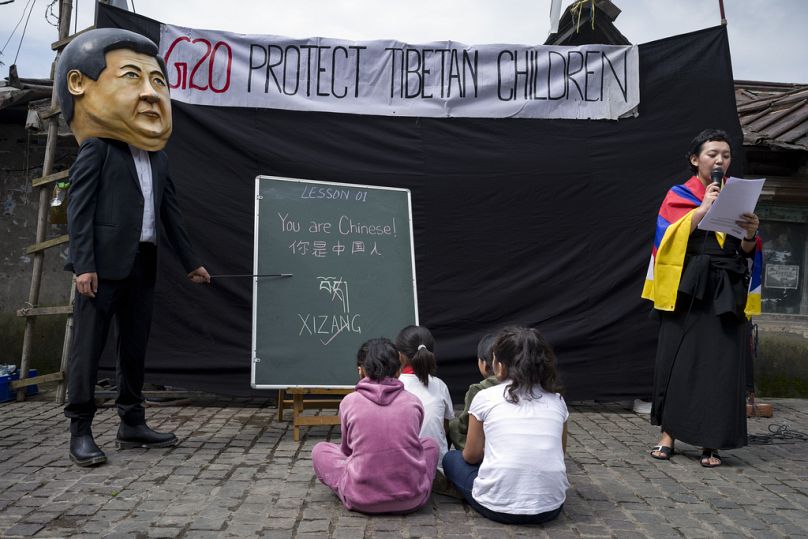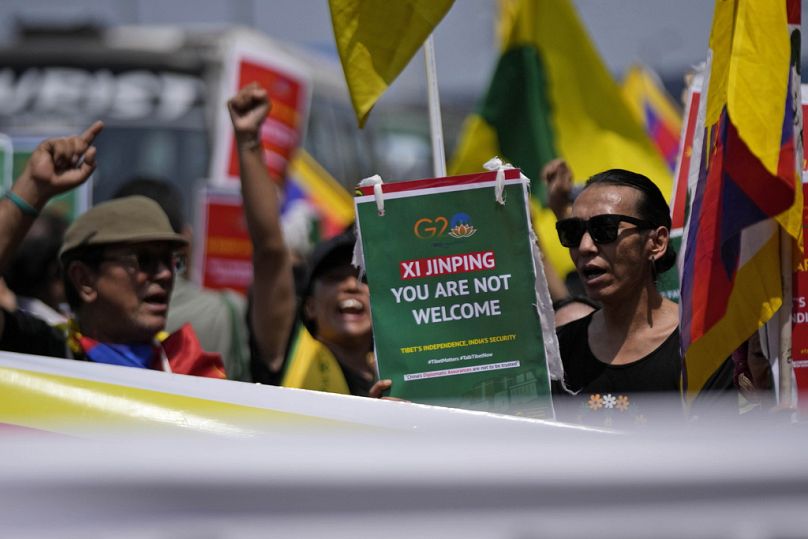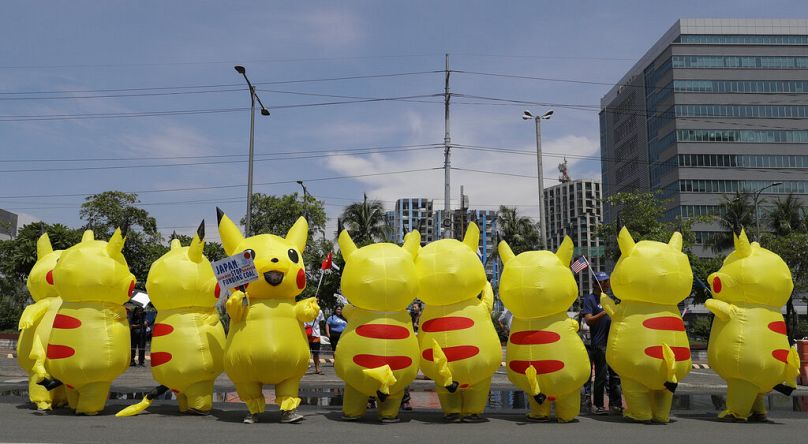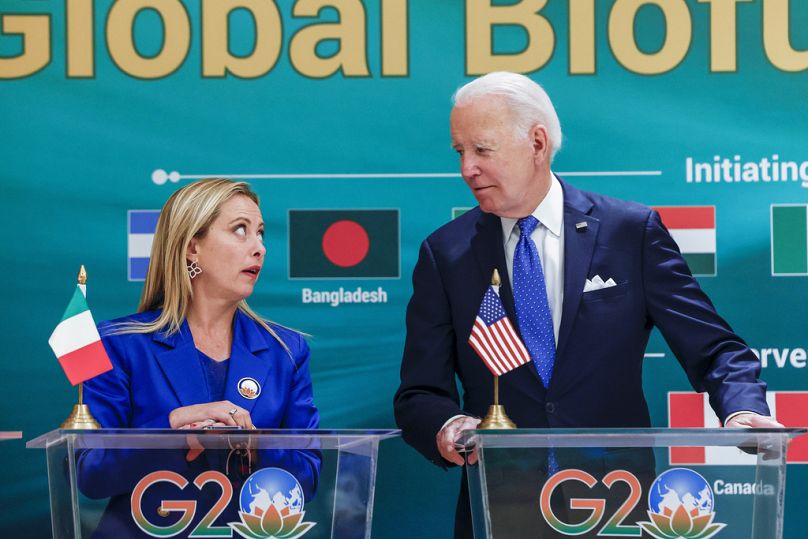The G20 has no choice. If it wants to stay relevant and play a vital role in providing the solutions humanity needs for our very survival, then it must reconsider its geopolitical squeamishness, Saman Rizwan writes.
On the surface level, this year’s G20 appeared to be a success. But beneath the PR spins and the friendly handshakes, the G20 is more fractious than ever.
And its inability to address agenda-wrecking disputes will ultimately lead to the bloc’s irrelevance and demise.
After all, the world is facing a slew of competing emergencies: the escalating climate crisis, various humanitarian disasters, the seemingly endless Ukraine-Russia war, and the continued economic fallout from COVID-19 – all which require the diplomatic clout of the G20 to mitigate.
But unfortunately, this year’s G20 in India’s capital looked more insipid than ever before, drastically lacking a transformative edge and even leaving the bloc on the edge of a diplomatic cold war.
And it’s not only because Russia’s invasion of Ukraine has created a clear fault line throughout the bloc, or because commitments on transformative climate action were found wanting, with no mention of the critical net-zero goal of phasing out oil and gas.
It is because the G20 is failing to address the cataclysmic geopolitical divides, specifically the mounting territorial disputes, that are ripping apart the fabric of international collaboration.
If G20 can't resolve geopolitical issues, who can?
Already in the run-up to this year’s summit, China threatened to derail President Narendra Modi’s big international moment by releasing its 2023 standard map which showed parts of Russia and India, as well as the entirety of the South China Sea, as Chinese territory.
China’s expansionist tendencies are nothing new but targeting nuclear-armed India on the eve of its big G20 moment, which resulted in the glaring absence of Chinese Premier Xi Jinping, should be a red flag for the international community.
See, Modi may have claimed that “the G20 is not the place to resolve geopolitical issues.” But G20 members account for over 70% of global GDP, half of the world’s population, and comprise the top five biggest CO2 emitters.
If this group of countries, that come together every year, can’t resolve geopolitical issues and territorial disputes, then who can?
This is no more apparent than in the South China Sea where China’s hostile aggression is threatening regional stability and economic security.
China's role in rising tensions
The region is one of the world’s busiest shipping lanes home to billions of euros' worth of oil and natural gas.
But for decades China has been going to increasing lengths to protect its farcical “nine-dash-line claim” to the entirety of the South China Sea - which it still touts even though it was rejected by an arbitration court in 2016.
Over the years, China’s military presence and belligerence in the region have skyrocketed.
In recent months, the country has been accused of building military bases on disputed islands and even harassing fishing and coast guard vessels of neighbouring countries. And the rising tensions could easily turn deadly.
For example, in 1974 and 1988, China and Vietnam engaged in deadly clashes over disputed territory in the South China Sea.
It's perhaps no coincidence that US President Joe Biden travelled to Vietnam after the G20 summit to announce the signing of the "Comprehensive Strategic Partnership" – a historic deal that boosts relations between the two former bitter enemies.
After all, without the support of ASEAN nations, it will be impossible to curtail China’s staunch hold on the region.
The increasingly strange case of the Sultanate of Sulu
But Biden’s move is only the tip of the iceberg, and other G20 members must forge new partnerships to help ASEAN not only emerge from China’s economic shadow but come together in solidarity against China’s divisive strategies.
This means that world leaders must play a more prominent role in mediating longstanding disputes which are hindering unity in the South China Sea.
For example, relations between Malaysia and The Philippines have been strained following the result of a controversial arbitration case involving the defunct Sultanate of Sulu.
The Sulu heirs were awarded $15 billion (€14bn) after Malaysia allegedly stopped paying a colonial-era land lease fee to the Sulu after militants tied to the Sultanate clashed with Malaysian security forces in Sabah in 2013.
The award was eventually annulled – and even the Spanish attorney involved faces criminal charges back home - but the case highlights how territorial disputes, left unresolved for decades, are undermining vital partnerships during times of increased regional tension.
G20 has to stop hesitating if it wants to survive
The G20 has no choice. If it wants to stay relevant and play a vital role in providing the solutions humanity needs for our very survival, then it must reconsider its geopolitical squeamishness and offer a counterweight to China’s imperialist agenda.
This means diplomatic partnerships shouldn’t happen in back rooms after the G20 but on stage in front of the world.
It also means that G20 countries should translate their words into action by solidifying long-anticipated economic trade agreements and military alliances that have remained uncertain for years.
After all, between the G20 members, there is a wealth of experience to draw upon that would provide a strong platform for constructive diplomacy.
Just consider Biden’s new trilateral agreement with Japan and South Korea, or how the US mediated talks between bitter neighbours Israel and Lebanon to hash out a lucrative maritime agreement that navigated complex claims to undersea gas fields.
Ultimately, if G20 members can’t find ways to mitigate mounting territorial disputes then not only will they fail to tackle the globe's biggest challenges, but their hesitancy will also eventually lead to its, and perhaps our world’s, demise.
Saman Rizwan is a UK-based analyst on South Asian affairs. As a journalist and commentator, she frequently writes for publications including South China Morning Post, The Diplomat, The Nation, Forbes, and Newsweek.
At Euronews, we believe all views matter. Contact us at view@euronews.com to send pitches or submissions and be part of the conversation.
















